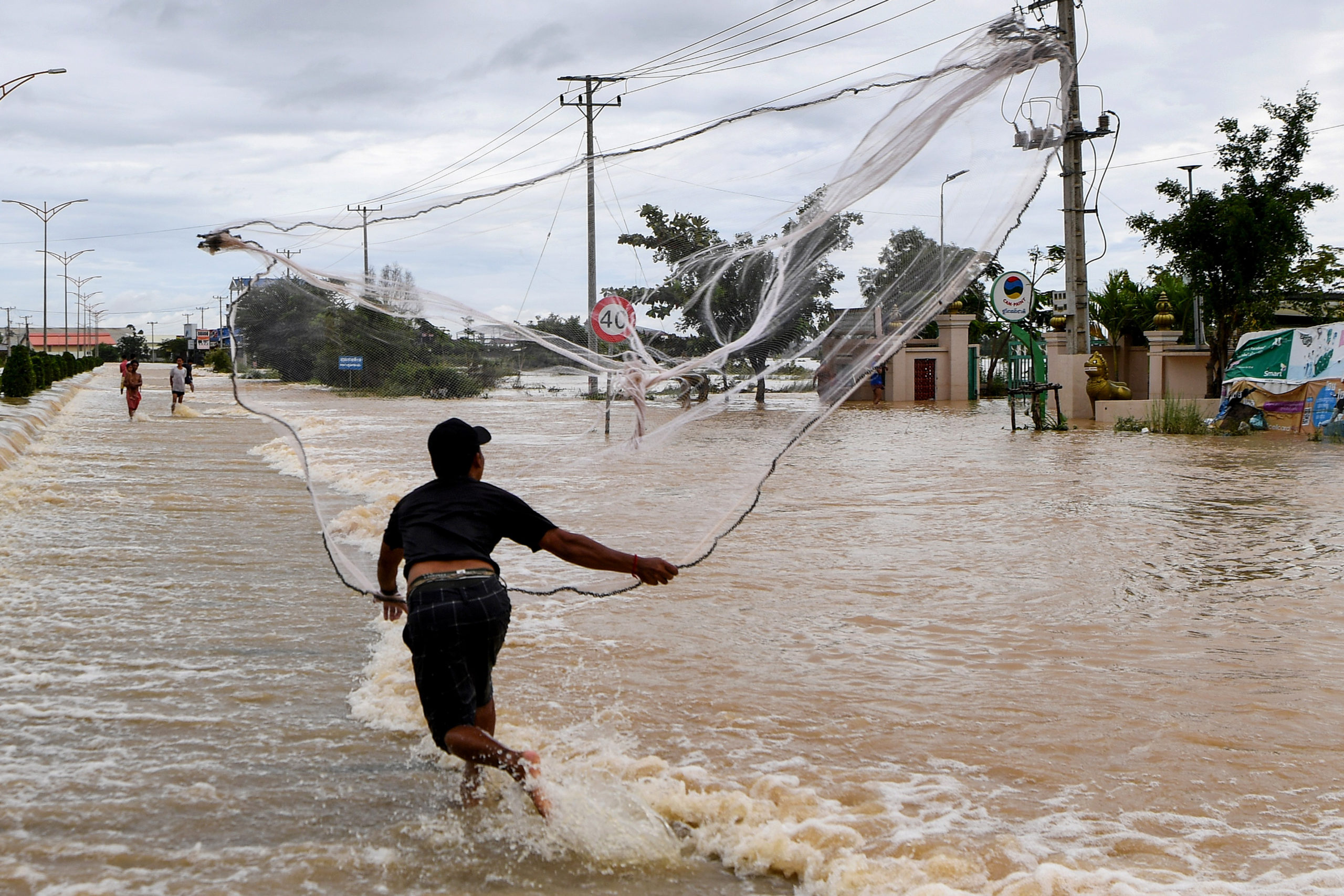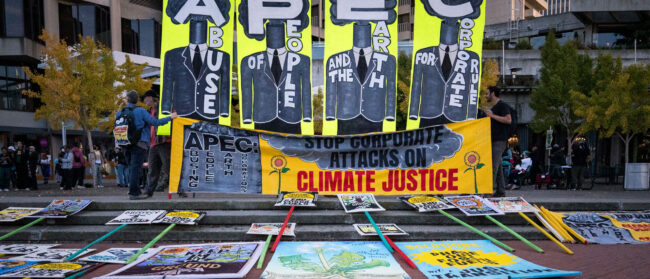Phnom Penh is no stranger to flooding. Every year, the city braces for floods as heavy rains fall, drainage systems clog, and water submerges streets.
Recent weeks have seen especially severe floods as 62 factories in Phnom Penh have been affected while some suspend the operations, and many major roads have been blocked.
But big events like these don’t even tell the whole story. While larger rural flood events garner the most media attention, smaller, shorter flood events in urban areas are cumulatively damaging in terms of economic and social costs and remain vastly under-reported.
A recent report by the Cambodian League for the Promotion and Defence of Human Rights (Licadho), Cambodia Youth Network, Equitable Cambodia, and Sahmakum Teang Tnaut warned that 1.2 million Phnom Penh residents, or almost half the city’s population, will be at risk of flooding because of the development of Boeung Tompun.
The south of Daun Penh, Prampi Makara, Chamkarmon, the southern part of Tuol Kork, the eastern part of Dangkor, and the western part of Meanchey are also prone to flood impacts, the report added. The effects of this urbanisation plan are immediately visible, with Phnom Penh City Hall announcing on October 12 a temporary halt on travel on Street 371 in the Meanchey district due to flooding.
Urban flooding is a problem experienced, to some extent, by all residents of Phnom Penh. But not everyone suffers equally, with the urban poor experiencing a disproportionate share of the costs.
It’s a vicious cycle: urban poor families are less prepared for flooding than their wealthier neighbours, so when flooding inevitably happens, it is the urban poor who suffer the lion’s share of the damage, further exacerbating their already precarious way of life.
The people living in poverty often come to Phnom Penh from the countryside in pursuit of work, with as many as 250,000 people living in informal settlements in Phnom Penh. These communities face numerous challenges – poor-quality housing, land and housing tenure insecurity, inadequate waste collection, poor sanitation, and low-paying jobs.
Each one of these challenges feeds into, and in turn, is compounded by destructive urban floods. Take the issue of waste management, for example.
A January 2019 study by Sahmakum Teang Tnaut, an urban-focused NGO, conducted in 12 khans (districts), 105 Sangkat (communes) and 277 urban poor communities in Phnom Penh found that 35.7% of these 277 urban poor communities receive no waste management services. Residents in these underserved communities are left to turn to other practices such as burning or burying waste, or disposing of it in open roads or in waterways.
Forcing residents to improvise with their waste disposal has obvious consequences when it comes to flooding. When waste finds its way into waterways, it further exacerbates already compromised drainage systems, which then increases the risk that these neighbourhoods will flood.
The health implications of flooding for the urban poor are also dire. UNICEF found out that 32.5% of poor urban dwellers in Phnom Penh do not have a toilet in their house, with a 2014 study finding that 42% of urban poor residents were affected by flooding from polluted bodies of water, putting them at risk of diseases like typhoid, cholera and hepatitis.
The bacteria-ridden stagnant floodwaters can “remain for up to 8 months of the year”, according to People in Need, surrounding communities with the smells of black creek water filled with garbage, resulting in outbreaks of waterborne diseases and exposure to industrial pollution. Participants in the People in Need also reported that the flood season brought with it “increased incidences of disease, including dengue fever, skin diseases, eye infections, chest infections and typhoid”.
Urban poor families also tend to live in structures made out of low-cost, non-durable materials, or they may live on the street or in construction sites. The flimsiness of these homes, or complete lack thereof, put them even further at risk to flood damage.
A study published in 2017 of three informal settlements in Phnom Penh – the communities of Borei Doemsrol, Chamrouen and Vealsbov – shows that these communities have all experienced floods which have damaged the low-quality self-built housing made from non-durable materials, necessitating costly repairs.
Particularly concerning is that poor households also have a lower capacity to cope with and adapt to shocks due to lower access to savings, borrowing, or social protection. Coping strategies such as borrowing money, reducing food consumption or taking children out of school can cause families to suffer significant long-term costs.
So, given the flooding vulnerability of the disenfranchised communities, livelihood shock could trap people into a cycle of poverty.
More responsible urban planning is a prerequisite for any future development, with success not a single policy, but a governance system that takes into account the long-term public interest
This year has brought with it new and unprecedented challenges; consider the excruciating impacts of Covid-19 on Cambodia’s economy. The Asian Development Bank projected the economy to contract 4.0% in 2020, a hard jolt from the runaway economic growth the Kingdom has experienced for more than two decades.
Although urban flooding rarely makes the national headline, the urban poor now are fighting dual disasters where urban flooding and Covid-19 intersect. It is alarmingly clear that those at the bottom of the economic pyramid will feel the hit the hardest, falling deeper into poverty.
Given the increasing unpredictability, the magnitude of flood and poorly planned urbanisation, these problems are likely to grow. But, what if urban flooding is a choice? Not an individual’s choice, but the choice of a small proportion of society who hold decision-making power.
The actual impacts of urban flooding on those living on the margins of society have been neglected. This has put precarious housing and employment arrangements in jeopardy, deepening the pre-existing inequalities. What the urban poor stand to lose by urban flooding is tremendous, and the future impacts of urban flooding are still unknown as climate change continues to threaten the region with some of the world’s fastest-rising water levels.
Considering the current and future flood risk and poverty situation in each location, combined measures for the poor in flood-prone areas need to be designed.
Sensible it is that the arguments on the cause of urban flooding will, in part, be determined by nature, but the true significance of it will hinge primarily on the rapid, unchecked development in the pursuit of immediate economic development. The sprawling and lucrative development such as land reclamation has filled 16 lakes, and partially filled other 10 lakes in Phnom Penh, making ways for construction projects. Given the loss of wetland and low flood protection level, the residents in Phnom Penh will stand to lose at a high price.
Although Cambodia has the Phnom Penh Green City Strategic Plan 2017-2026, the city remains lacking comprehensive urban planning. This needs to take into account the cost and benefit analysis of these developments to understand how these reclamation-based investments affect the socio-economic situation in the short and long term.
Ultimately, more responsible urban planning is a prerequisite for any future development, with success not a single policy, but a governance system that takes into account the long-term public interest.
Horn Chanvoitey is a Junior Research Fellow at Future Forum, an independent Cambodia-based public policy think-tank.


